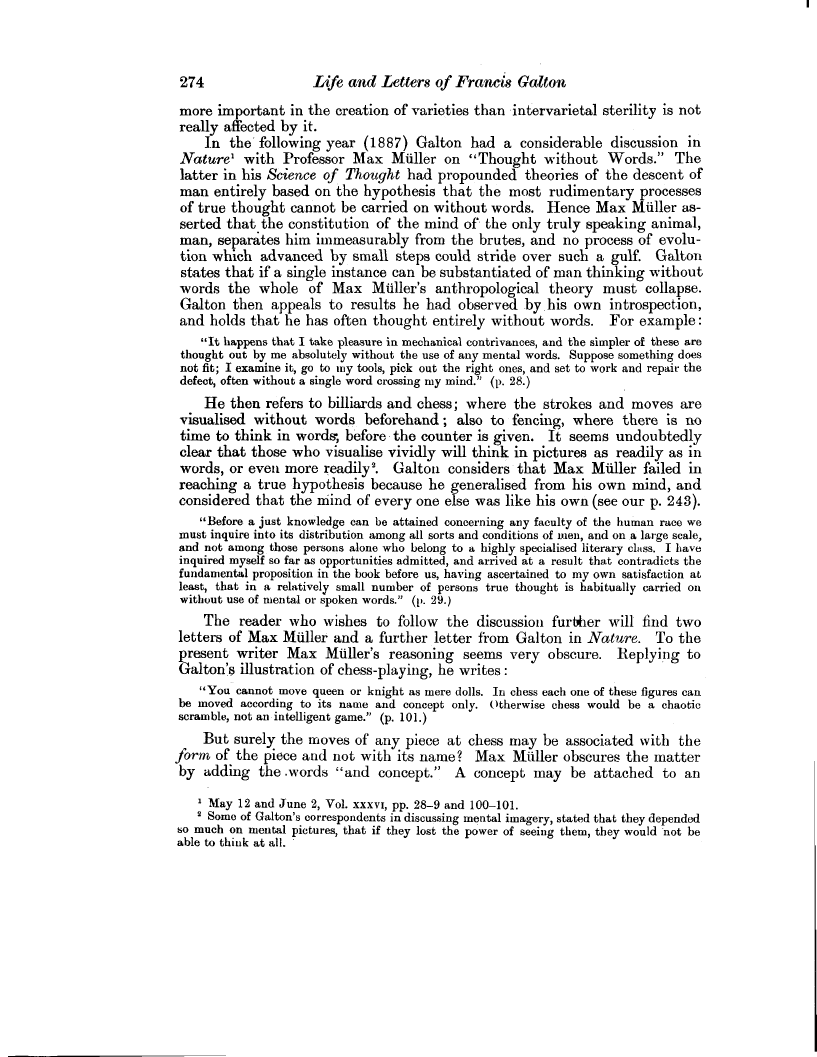274 Life and Letters of Francis Galton
more important in the creation of varieties than intervarietal sterility is not really affected by it.
In the following year (1887) Galton had a considerable discussion in Nature' with Professor Max Muller on "Thought without Words." The latter in his Science of Thought had propounded theories of the descent of man entirely based on the hypothesis that the most rudimentary processes of true thought cannot be carried on without words. Hence Max Muller asserted that the constitution of the mind of the only truly speaking animal, man, separates him immeasurably from the brutes, and no process of evolution which advanced by small steps could stride over such a gulf. Galton states that if a single instance can be substantiated of man thinking without words the whole of Max Miiller's anthropological theory must collapse. Galton then appeals to results he had observed .by.his own introspection, and holds that he has often thought entirely without words. For example
"It happens that I take pleasure in mechanical contrivances, and the simpler of these are thought out by me absolutely without the use of any mental words. Suppose something does not fit; I examine it, go to my tools, pick out the right ones, and set to work and repair the defect, often without a single word crossing my mind." (p. 28.)
He then refers to billiards and chess; where the strokes and moves are visualised without words beforehand ; also to fencing, where there is no time to think in words-, before the counter is given. It seems undoubtedly clear that those who visualise vividly will think in pictures as readily as in words, or even more readily'. Galton considers that Max Muller failed in reaching a true hypothesis because he generalised from his own mind, and considered that the mind of every one else was like his own (see our p. 243).
"Before a just knowledge can be attained concerning any faculty of the human race we must inquire into its distribution among all sorts and conditions of wen, and on a large scale, and not among those persons alone who belong to a highly specialised literary class. I have
inquired myself so far as opportunities admitted, and arrived at a result that contradicts the fundamental proposition in the book before us, having ascertained to my own satisfaction at least, that in a relatively small number of persons true thought is habitually carried on
without use of mental or spoken words." (1). 29.)
The reader who wishes to follow the discussion further will find two letters of Max Muller and a further letter from Galton in Nature. To the present writer Max Miiller's reasoning seems very obscure. Replying to Galton's illustration of chess-playing, he writes
"You cannot move queen or knight as mere dolls. In chess each one of these figures can be moved according to its name and concept only. Otherwise chess would be a chaotic scramble, not an intelligent game." (p. 101.)
But surely the moves of any piece at chess may be associated with the form of the piece and not with its name? Max Muller obscures the matter by adding the words "and concept." A concept may be attached to an
1 May 12 and June 2, Vol. xxxvi, pp. 28-9 and 100-101.
2 Some of Galton's correspondents in discussing mental imagery, stated that they depended so much on mental pictures, that if they lost the power of seeing them, they would "not be able to think at all.

